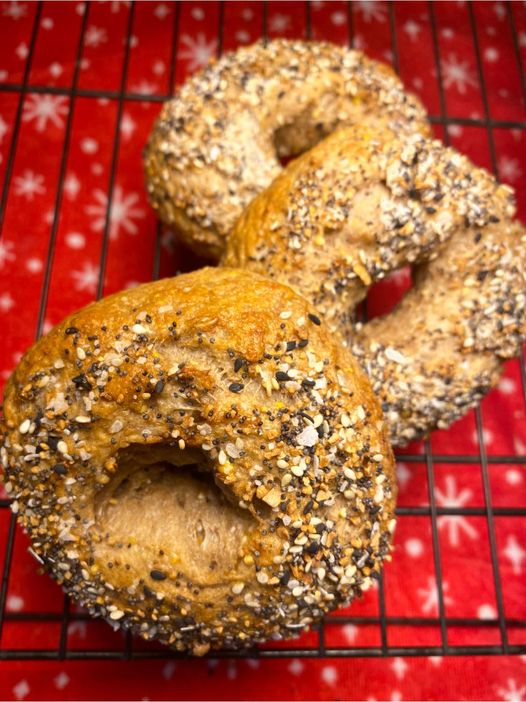Check Out These Asparagus Facts (Or, Skip Straight to the Recipe):
Hope you find these facts interesting and informative! Enjoy your Baked Asparagus 4-Cheese Twists!
Asparagus is a seasonal vegetable that typically has a short harvest period, lasting from late March to early June in most parts of North America. However, the exact timing of the season can vary depending on factors such as climate and location.
Asparagus is a perennial plant that thrives in cool temperatures and well-draining soil. In order to grow, asparagus plants need a period of dormancy during the winter months, followed by a warm spring to encourage new growth. As such, the timing of the asparagus season is largely determined by the weather patterns in a given area.
In addition to climate, the asparagus season can also be affected by other factors such as soil conditions, disease, and pests. Asparagus plants require well-draining soil with high organic content, and can be susceptible to diseases such as asparagus rust and pests such as asparagus beetles. Proper soil management and pest control are important to ensure a healthy, productive asparagus crop.
While asparagus is available year-round in many grocery stores, the freshest and most flavorful asparagus is typically found during the local growing season. So, if you’re a fan of this tasty vegetable, be sure to keep an eye out for it at your local farmers’ market or grocery store during the spring and early summer months!
- Asparagus is a member of the lily family and is related to onions, garlic, and leeks.
- The word “asparagus” comes from the Greek word “asparagos,” which means “sprout” or “shoot.”
- Asparagus is a perennial plant that can live for up to 20 years.
- Asparagus plants can grow up to 10 inches in a day under ideal conditions.
- There are over 300 varieties of asparagus, but only 20 are edible.
- White asparagus is grown by keeping the plant covered with soil to prevent photosynthesis and chlorophyll production.
- Asparagus is a good source of vitamin C, vitamin K, folate, and fiber.
- Asparagus can act as a natural diuretic, helping to flush excess fluid from the body.
- Asparagus is low in calories, with only 20 calories per 100 grams.
- Asparagus has been prized for its medicinal properties for thousands of years and was used by ancient Greeks and Romans to treat a variety of ailments.

Baked Asparagus 4-Cheese Twists
Bucket of BreadIngredients
- Your choice of Bucket of Bread dough
- Asparagus
- Cubed Prosciutto
- 4-Cheese Italian blends such as grated Parmigiano-Reggiano, Pecorino Romano, mozzarella, and provolone.
- 1 Egg
Instructions
- Get out a prepared Bucket of Bread brand dough mix and preheat the oven to 450 F.
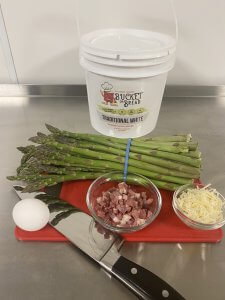
- Wash and cut off the ends of your farmers market fresh asparagus.
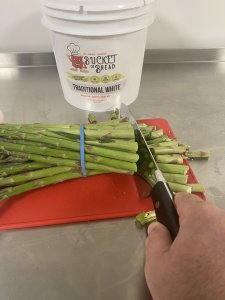
- Roll out some ropes of dough.
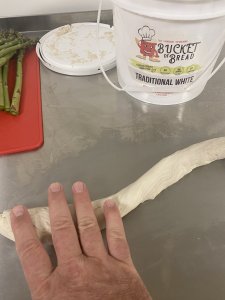
- Wrap the ropes around the asparagus.
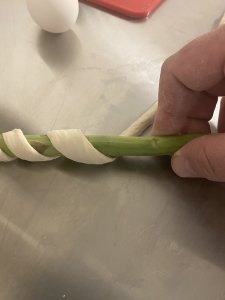
- Poke prosciutto into the dough around each stalk.

- Egg wash everything.

- Sprinkle on cheese.
- Bake at 20 minutes. Serve warm!

- Serve warm and enjoy!

Video
Notes
Interested in a Collaboration?
Send a quick message so we can chat about how you can get a recipe named after you, your business, or your cause. Also, receive back links to your URL directly from the Bucket of Bread recipe pages!


